虚拟语气知识点总结讲解
(完整版)英语虚拟语气语法归纳总结
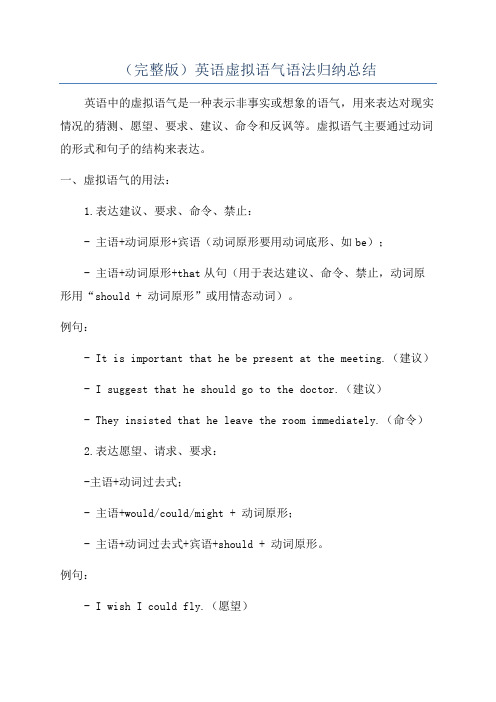
(完整版)英语虚拟语气语法归纳总结英语中的虚拟语气是一种表示非事实或想象的语气,用来表达对现实情况的猜测、愿望、要求、建议、命令和反讽等。
虚拟语气主要通过动词的形式和句子的结构来表达。
一、虚拟语气的用法:1.表达建议、要求、命令、禁止:- 主语+动词原形+宾语(动词原形要用动词底形、如be);- 主语+动词原形+that从句(用于表达建议、命令、禁止,动词原形用“should + 动词原形”或用情态动词)。
例句:- It is important that he be present at the meeting.(建议)- I suggest that he should go to the doctor.(建议)- They insisted that he leave the room immediately.(命令)2.表达愿望、请求、要求:-主语+动词过去式;- 主语+would/could/might + 动词原形;- 主语+动词过去式+宾语+should + 动词原形。
例句:- I wish I could fly.(愿望)- I would appreciate it if you could help me.(请求)3.表示虚拟条件:- If条件从句中的谓语动词用过去完成时,主句用would/should/might/could + have + 过去分词;- If条件从句中的谓语动词用过去时,主句用would/should/could + 动词原形。
例句:- If I had known his phone number, I would have called him.(虚拟条件)- If you had listened to me, we could have finished the project earlier.(虚拟条件)4.表达建议、要求、祝愿:- If only内部称述 + 主语 + 过去式。
英语语法 虚拟语气的知识点归纳
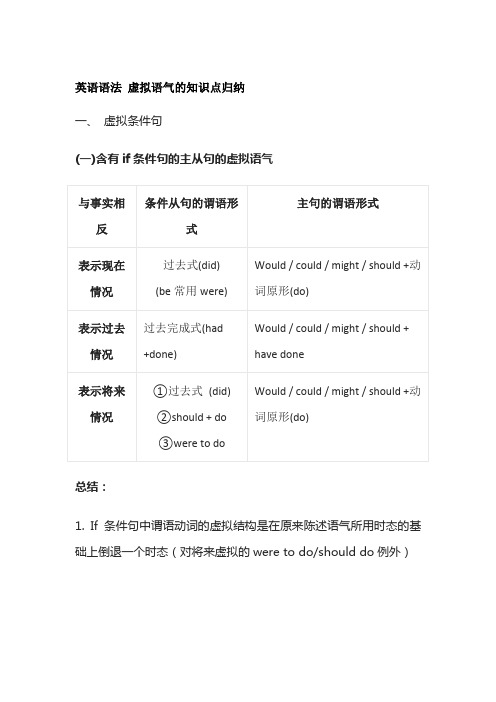
英语语法虚拟语气的知识点归纳一、虚拟条件句(一)含有if条件句的主从句的虚拟语气总结:1. If 条件句中谓语动词的虚拟结构是在原来陈述语气所用时态的基础上倒退一个时态(对将来虚拟的were to do/should do例外)2. 主句要借助于情态动词的过去式,后跟动词原形(现在或将来)或have done(过去);if条件句中只出现一个情态动词,即对将来虚拟的should.3.做此类题目时一定要分清是从句还是主句谓语动词的虚拟,还要把握好时态。
注意:1. 在虚拟条件从句中,动词“be”的过去时态一律用”were”,不用was。
2. 在虚拟条件状语中如果有were, should, had这三个词中任何一个,可省略if,把这三个词提到主语之前, 变成:were/should/had +主语+剩余成分。
3.在虚拟条件状语从句中,省略连词的倒装形式的句首不能用动词的缩略形式。
如我们可说Were I not to do., 而不能说Weren‘t I to do。
4.在表示与将来事实相反的条件句中,只能用should,而不能用would,could和might 等。
5.主句中的should通常用于第一人称,would,could以及might 可以用于各种人称eg :①If I were a bird, I could fly in the air.如果我是一只小鸟,我就能在空中飞行。
②I wish I could pass the examination.我希望我能通过考试。
在虚拟条件句中,对于与将来事实相反的情形,请注意以下几点:(1)条件从句表示的内容与将来事实相反,实为对将来情况的推测,用过去时表示虚拟;(2)条件从句谓语除用过去式外,有时也用“should+动词原形(表示可能性极小,常译为“万一”)”或“were to+动词原形(表示与将来事实相反的假设)”;(3)条件从句使用“should+动词原形”这样的谓语形式时,主句谓语除可用“should (would, could, might)+动词原形”这样的虚拟语气形式外,也可用直陈语气或祈使语气。
虚拟语气知识点简述
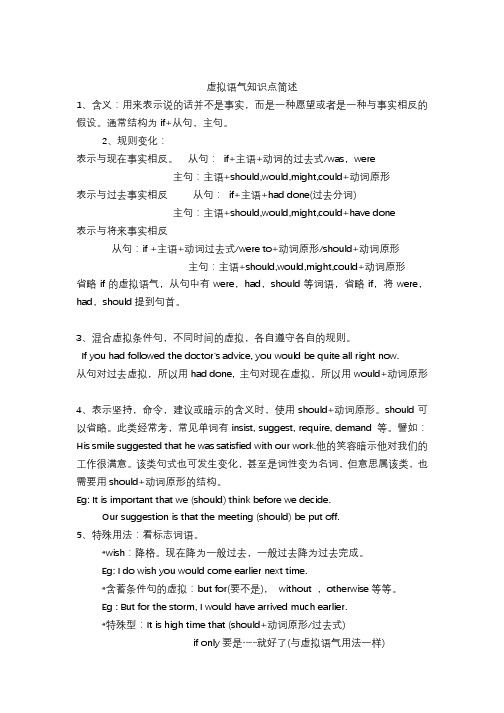
虚拟语气知识点简述1、含义:用来表示说的话并不是事实,而是一种愿望或者是一种与事实相反的假设。
通常结构为if+从句,主句。
2、规则变化:表示与现在事实相反。
从句:if+主语+动词的过去式/was,were主句:主语+should,would,might,could+动词原形表示与过去事实相反从句:if+主语+had done(过去分词)主句:主语+should,would,might,could+have done表示与将来事实相反从句:if +主语+动词过去式/were to+动词原形/should+动词原形主句:主语+should,would,might,could+动词原形省略if的虚拟语气,从句中有were,had,should等词语,省略if,将were,had,should提到句首。
3、混合虚拟条件句,不同时间的虚拟,各自遵守各自的规则。
If you had followed the doctor’s advice, you would be quite all right now.从句对过去虚拟,所以用had done, 主句对现在虚拟,所以用would+动词原形4、表示坚持,命令,建议或暗示的含义时,使用should+动词原形。
should可以省略。
此类经常考,常见单词有insist, suggest, require, demand 等。
譬如:His smile suggested that he was satisfied with our work.他的笑容暗示他对我们的工作很满意。
该类句式也可发生变化,甚至是词性变为名词,但意思属该类,也需要用should+动词原形的结构。
Eg: It is important that we (should) think before we decide.Our suggestion is that the meeting (should) be put off.5、特殊用法:看标志词语。
英语语法 虚拟语气的知识点归纳
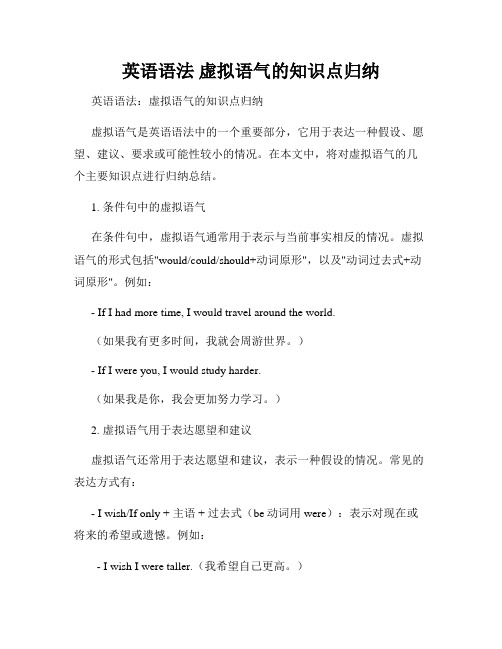
英语语法虚拟语气的知识点归纳英语语法:虚拟语气的知识点归纳虚拟语气是英语语法中的一个重要部分,它用于表达一种假设、愿望、建议、要求或可能性较小的情况。
在本文中,将对虚拟语气的几个主要知识点进行归纳总结。
1. 条件句中的虚拟语气在条件句中,虚拟语气通常用于表示与当前事实相反的情况。
虚拟语气的形式包括"would/could/should+动词原形",以及"动词过去式+动词原形"。
例如:- If I had more time, I would travel around the world.(如果我有更多时间,我就会周游世界。
)- If I were you, I would study harder.(如果我是你,我会更加努力学习。
)2. 虚拟语气用于表达愿望和建议虚拟语气还常用于表达愿望和建议,表示一种假设的情况。
常见的表达方式有:- I wish/If only + 主语 + 过去式(be动词用were):表示对现在或将来的希望或遗憾。
例如:- I wish I were taller.(我希望自己更高。
)- If only she could speak fluent English.(要是她能说一口流利的英语就好了。
)- It is time + 主语 + 过去式(should + 动词原形):用于表示现在或将来应该发生的动作。
例如:- It is time we started the meeting.(是时候开始会议了。
)- It is time you should apologize to her.(你应该向她道歉了。
)3. 虚拟语气在宾语从句中的使用在宾语从句中,若主句的动词表达了建议、命令、要求等含义时,宾语从句中的谓语动词常使用虚拟语气。
具体的用法如下:- 建议:suggest/recommend + (that) + 主语 + (should)+ 动词原形。
虚拟语气英语知识点总结

虚拟语气英语知识点总结一、虚拟语气的概念。
虚拟语气是一种特殊的动词形式,用来表示说话人所说的话不是一个事实,而是一种假设、愿望、怀疑、猜测或建议等。
二、虚拟语气在条件句中的用法。
1. 与现在事实相反的虚拟条件句。
- 结构:从句(If + 主语+ 动词的过去式(be动词一般用were)),主句(主语+ would/should/could/might+动词原形)。
- 例如:If I were you, I would study harder.(如果我是你,我会更努力学习。
实际上我不是你)2. 与过去事实相反的虚拟条件句。
- 结构:从句(If+主语+had+过去分词),主句(主语+would/should/could/might + have+过去分词)。
- 例如:If he had taken my advice, he would have passed the exam.(如果他听了我的建议,他就会通过考试了。
实际上他没听建议,也没通过考试)3. 与将来事实相反的虚拟条件句。
- 结构:从句(If+主语+动词的过去式/should+动词原形/were to+动词原形),主句(主语+would/should/could/might+动词原形)。
- 例如:If it rained tomorrow, we would stay at home.(如果明天下雨,我们就会待在家里。
明天是否下雨还不确定,但这是一种假设情况)- 或者If he should come tomorrow, I would tell him the news.(如果他明天来,我就会告诉他这个消息)- 以及If I were to see her tomorrow, I would give her the book.(如果我明天见到她,我就会把书给她)三、虚拟语气在宾语从句中的用法。
1. wish后的宾语从句。
- 表示与现在事实相反的愿望,从句谓语动词用过去式(be动词用were)。
中考中的虚拟语气知识点总结与归纳

中考中的虚拟语气知识点总结与归纳虚拟语气作为语法的一种特殊形式,在中考中经常被考察。
掌握虚拟语气的概念、用法以及常见的考点是提高语文成绩的关键。
本文将对中考中的虚拟语气知识点进行总结与归纳,帮助同学们更好地准备中考。
一、虚拟语气的概念虚拟语气是表示说话者所说的话与实际情况相反或者与现实不符的一种语气。
它常用于条件句、愿望句、建议句中,用来表达与现实相反的想法、愿望、建议或推测。
虚拟语气的形式多样,包括虚拟条件句、虚拟愿望句、虚拟命令句等。
二、虚拟语气的用法1. 虚拟条件句虚拟条件句常用于假设、推测等情况下,表示与现实相反的假设条件。
一般由“虚拟引导词(if, unless, whether, suppose, as if/though等)+主语+动词原形”构成。
在中考中,常见的虚拟条件句考点包括:- 省略if引导词的虚拟条件句:Had it not rained yesterday, we would have gone hiking.- 带有had的虚拟条件句:If I had enough money, I would have bought a new car.- 倒装形式的虚拟条件句:Were I you, I would study harder.2. 虚拟愿望句虚拟愿望句用于表达与现实相反的愿望、希望等情感。
一般由“虚拟引导词(wish, hope, would rather, if only等)+主语+动词过去式”构成。
在中考中,常见的虚拟愿望句考点包括:- 带有would的虚拟愿望句:I wish I were a bird, then I could fly freely.- 表示过去愿望的虚拟愿望句:She wished she had studied harder for the exam.3. 虚拟命令句虚拟命令句用于表示建议、要求等意义上的虚拟语气。
一般由“虚拟引导词(suggest, demand, insist等)+主语+动词原形”构成。
英语虚拟语气知识点

英语虚拟语气知识点(经典版)编制人:__________________审核人:__________________审批人:__________________编制单位:__________________编制时间:____年____月____日序言下载提示:该文档是本店铺精心编制而成的,希望大家下载后,能够帮助大家解决实际问题。
文档下载后可定制修改,请根据实际需要进行调整和使用,谢谢!并且,本店铺为大家提供各种类型的经典范文,如演讲稿、总结报告、合同协议、方案大全、工作计划、学习计划、条据书信、致辞讲话、教学资料、作文大全、其他范文等等,想了解不同范文格式和写法,敬请关注!Download tips: This document is carefully compiled by this editor. I hope that after you download it, it can help you solve practical problems. The document can be customized and modified after downloading, please adjust and use it according to actual needs, thank you!In addition, this shop provides you with various types of classic sample essays, such as speech drafts, summary reports, contract agreements, project plans, work plans, study plans, letter letters, speeches, teaching materials, essays, other sample essays, etc. Want to know the format and writing of different sample essays, so stay tuned!英语虚拟语气知识点虚拟语气一般指说话人的主观愿望或假想,是与客观存在相反的事实,或在现实中无法成真的事情或情形。
英语《虚拟语气》语法知识总结归纳
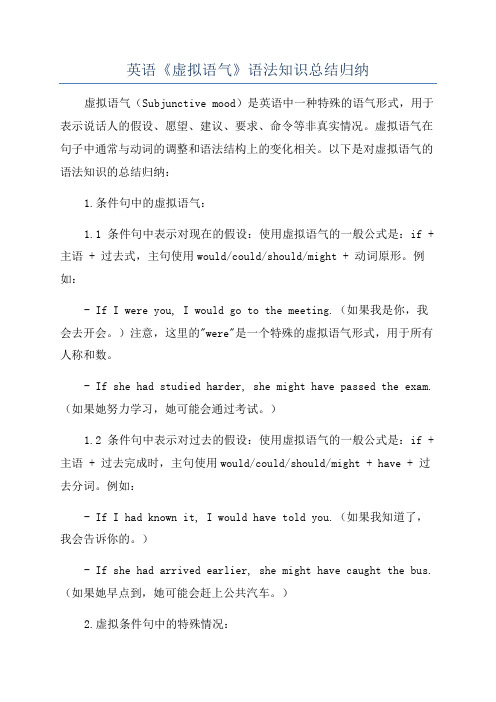
英语《虚拟语气》语法知识总结归纳虚拟语气(Subjunctive mood)是英语中一种特殊的语气形式,用于表示说话人的假设、愿望、建议、要求、命令等非真实情况。
虚拟语气在句子中通常与动词的调整和语法结构上的变化相关。
以下是对虚拟语气的语法知识的总结归纳:1.条件句中的虚拟语气:1.1 条件句中表示对现在的假设:使用虚拟语气的一般公式是:if + 主语 + 过去式,主句使用would/could/should/might + 动词原形。
例如:- If I were you, I would go to the meeting.(如果我是你,我会去开会。
)注意,这里的"were"是一个特殊的虚拟语气形式,用于所有人称和数。
- If she had studied harder, she might have passed the exam.(如果她努力学习,她可能会通过考试。
)1.2 条件句中表示对过去的假设:使用虚拟语气的一般公式是:if + 主语 + 过去完成时,主句使用would/could/should/might + have + 过去分词。
例如:- If I had known it, I would have told you.(如果我知道了,我会告诉你的。
)- If she had arrived earlier, she might have caught the bus.(如果她早点到,她可能会赶上公共汽车。
)2.虚拟条件句中的特殊情况:2.1 在虚拟条件句中表示命令、建议时,主句中的动词可以使用动词原形(而不是would/could/should/might + 动词原形)。
例如:- If you have any questions, please let me know.(如果你有任何问题,请告诉我。
)- If I were you, I would take a break.(如果我是你,我会休息一下。
- 1、下载文档前请自行甄别文档内容的完整性,平台不提供额外的编辑、内容补充、找答案等附加服务。
- 2、"仅部分预览"的文档,不可在线预览部分如存在完整性等问题,可反馈申请退款(可完整预览的文档不适用该条件!)。
- 3、如文档侵犯您的权益,请联系客服反馈,我们会尽快为您处理(人工客服工作时间:9:00-18:30)。
虚拟语气定义:表示说话人所说的不是事实,而是一种假设、愿望、怀疑或推测。
应用:错综时间条件句:A.非真实性条件句:if省略句:把were,had,should提到句首,变为倒装句式。
(Attention:否定形式)含蓄条件句:表示隐含条件,结构与if同。
(without, but for, or/otherwise)a. wish后接宾语从句,表示不可能实现的愿望。
宾语从句 b. 用于表示建议、命令、要求等动词后宾语从句。
B.名词性从句: c. would rather主语从句:It is/was+形容词/过去分词+ that从句。
表语从句&同位语从句:在suggestion, proposal, order, plan, idea,request, advice等名词后的表语从句和同位语从句中要用虚拟语气,C.as if/as though引导的从句:常与seem/look/appear等动词连用,表示“看起来似乎……”;以及if only表示“要是……该多好呀”。
(结构同wish)D.定语从句和状语从句:定语从句:It is (high) time (that)…句型中。
目的状语从句:in case, for fear that, in order that, so that等引导目的状语从句。
考点一 虚拟语气在非真实性条件句的运用要点归纳:真实条件句:假设的情况是有可能发生,谓语要用陈述语气。
条件句非真实条件句,即虚拟条件句。
假设的情况是过去或现在都不存在的,或将来不大可能发生。
e. g. If it doesn’t rain tomorrow, we will go to the park.If he had seen you yesterday, he would have asked you about it.虚拟语气结构列表如下:e.g. If he were here, everything would be all right.从句(条件句) 主句(结果句) 与现在事实相反的假设If +主语+动词过去式(were ) 主语+ should/would/could/might +动词原形 与过去事实相反的假设 If +主语+ had +过去分词主语+ should/would/could/might + have +过去分词与将来事实相反的假设 1. If +主语+动词过去式 2. If +主语+ were to +动词原形 3. If +主语+ should +动词原形主语+ should/would/could/might +动词原形If her mother had taken the doctor’s advice, she would/might have got well earlier.If it were to rain tomorrow, the match would be canceled.1、错综时间条件句有时条件从句的动作和主句动作发生的时间不一致,这时需根据意思采用表示不同时间的动词形式来进行调整。
If she had taken the doctor’s advice, she might still be alive.If I were you, I would have accepted their terms.2、if省略句,采用局部倒装语序。
把had /should/were等动词(不包括行为动词)移到从句的句首。
If I were at school again, I would study harder.Were I at school again, I would study harder.If it should rain tomorrow, we would not go climbing.Should it rain tomorrow, we would not go climbing.If you had come earlier, you would have caught the bus.Had you come earlier, you would have caught the bus.3、含蓄条件句:有时候假设的情况并不用条件从句表示出来,而是通过其他手段来表示。
(without/but for/otherwise/or/but)Without air (If there were no air), there would be no living things.But for your help (If it hadn’t been for your help), I couldn’t have done it.【小试牛刀】1.We __________ (be) back in the hotel now if you didn’t lose the map.2. If he __________ (catch) the morning train, he would not have been late for the meeting.3. If we __________ (book) a table earlier, we wouldn’t be standing here in a queue.考点二 虚拟语气在名词性从句中的应用要点归纳: a. wish + (that) + ✿宾语从句 b. 用于表示建议、命令、要求等动词后宾语从句,结构为“(should)+动词原形”c. would rather + sb + e.g.a. I wish I were better -looking.I wish I had met the film star just now.I wish I would be a soldier.b. The young man insisted that I (should) go with his fellows.The doctor advised that he change his job.c. ——Shall I open the window?——I’d rather you didn’t.【小试牛刀】1. How I wish every family ______ a large house with a beautiful garden!A. hasB. hadC. will haveD. had had2. Teachers recommend parents ______ their children under 12 to ride bicycles to school for safety. 过去式 (现在/将来)had + 过去分词 (过去)过去式(were) (现在)had + 过去分词 (过去)一坚持:insist 二命令:order / command 四建议:advise / suggest / recommendA. not allowB. do not allowC. mustn’t allowD. couldn’t allow3. George is going to talk about the geography of his country, but I’d rather he ______ more on its culture.A. focusB. focusedC. would focusD. had focused✿主语从句:It is/was+形容词/过去分词+ that从句,从句谓语动词为“(should)+动词原形”。
desired/suggested/proposed/recommended/important/necessary/strange/natural/essential/a pity等e.g. It is natural that she (should) do so.Attention: 以上句式也可用陈述句式。
e.g. It’s a pity that you can’t dance.【小试牛刀】— Don’t you think it necessary that he ______ to Miami but to New York?— I agree, but the problem is ______ he has refused to.A. will not be sent; thatB. not be sent; thatC. should not be sent; whatD. should not send; what✿表语从句&同位语从句:在suggestion, proposal, order, plan, idea, request, advice等名词后的表语从句和同位语从句中要用虚拟语气,结构:“(should)+动词原形”。
e.g. My idea is that we (should) think it over before accepting it.考点三虚拟语气在as if/as though引导的从句中的应用要点归纳:as if (as though)引导的方式状语从句可用陈述语气,也可用虚拟语气。
常与seem/look/appear等动词连用,表示“看起来似乎……”;以及if only意为“要是……该多好呀”,表示与事实相反的愿望。
(结构同wish)e.g. He talks as if he knew where she was.He talks about Rome as if he had been there before.It looks as if it might snow.e.g. If only the player had had more courage!If only Daisy would go with me!【小试牛刀】1.——It was John who broke the window.——Why are you talking to me as if I __________ (do) it?2.He speaks Chinese so fluently as if he __________ (be) a Chinese.3.Looking round the town, he left as though he __________ (be) away for ages.4.Look at the trouble I am in! If only I ______ your advice.A. followedB. would followC. had followedD. should follow考点四虚拟语气在定语从句和状语从句中的应用要点归纳:定语从句:It is (high) time (that)…句型中,谓语动词用一般过去时,或用“should + 动词原形”,意为“(现在)该……”,用来表示建议。
